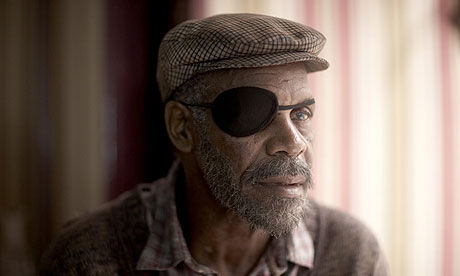
The Tropic Thunder "retard" row was about a word. The clamour about Blindness, which has prompted the picketing of 75 American cinemas, involves something altogether more substantial.
Whatever you may think of the label attached to Simple Jack, his character was treated sympathetically by Ben Stiller. Blindness, on the other hand, "portrays blind people as monsters ... incompetent, filthy, vicious, and depraved," according to Marc Maurer, the president of the National Federation of the Blind, which organised the protest.
Of course, the blind characters in Blindness aren't your common-or-garden visually challenged. They're sighted people suddenly plunged into sightlessness by a mysterious disease, who become savage and depraved when herded into quarantine centres. The whole thing, according to the director, Fernando Meirelles, is an allegory: "The film has nothing to do with blind people," he told The Scotsman, "It's about human nature."
So that's all right then. Or is it? A narrative's effectiveness as allegory surely depends in part on the persuasiveness of the real-life analogue on which it relies. If imposing blindness is a good way of bringing out the dark side of human beings for the purposes of fiction, why shouldn't cinemagoers suspect that actual loss of sight might arouse feelings not altogether benign? Live-action movie-making, with its relentless predisposition towards realism, may face more difficulty than other art forms in getting people to see beyond what's actually in front of their eyes.
At present, blind people enjoy more respect and sympathy than perhaps any other disadvantaged group. They're rarely associated with malign intent. Certainly, cinema's fascination with them has generally been solicitous. An unexpectedly negative depiction seems likely to sully their image, however limited its impact may be (and no one's predicting big box-office for Blindness).
Some maintain that the way people or things are represented on screen has no impact at all on the way they're perceived. Audiences, it's suggested, are quite capable of telling the difference between fact and fiction. How, though, do we form our attitude to anything? It would be strange if cultural artefacts didn't play some role. Advertisers are surely paying out money for something. It's hard to believe that Shylock and Fagin didn't play some small part in the shaping of attitudes to the jews.
In Britain, no protests against Blindness seem to be planned. Nonetheless, the Royal National Institute for the Blind is far from happy. Its own concern is not so much that Meirelles' film might redirect attitudes. On the contrary, its spokesperson told me, the institute's fear is that it may reinforce existing unhelpful stereotypes. Vicious or not, the blind in Blindness are utterly dependent and helpless; the RNIB would like people to know that most of their blind fellow-citizens manage to live independently and with dignity.
The American and British anxieties aren't mutually exclusive. Blindness may both arouse fears and deepen disdain. That's not to say, of course, that the protests which it's prompted should be heeded. The protection of disadvantaged minorities may be a worthy goal, but so too is the promotion of free expression. Protecting this freedom means nothing if it fails to embrace both the opportunity to demean and the right to misrepresent.
You don't have to be Nietzsche to believe that the demands of the strong must often prevail over the needs of the weak. Nonetheless, let's not pretend that artistic licence comes cost-free. Or that those most deserving of society's support may not sometimes have to pay part of its price.

